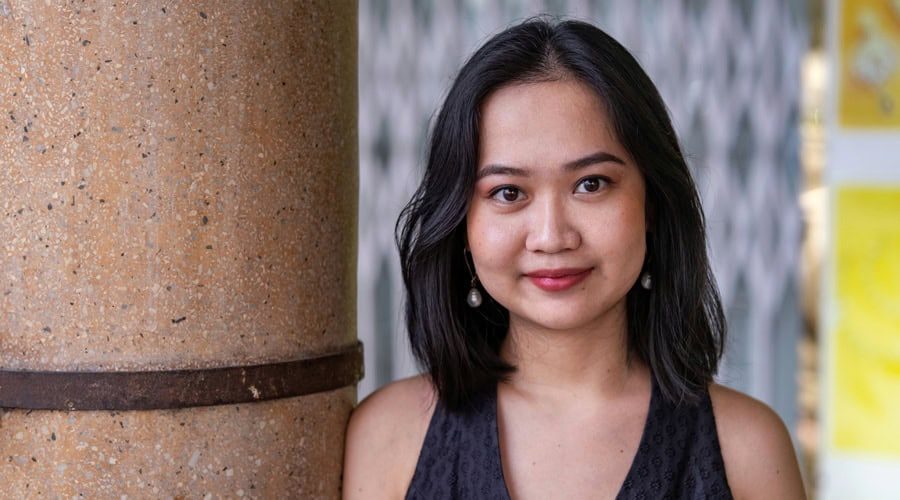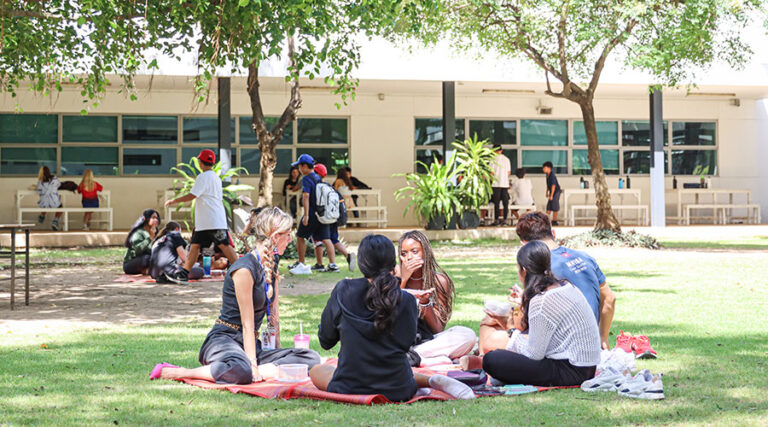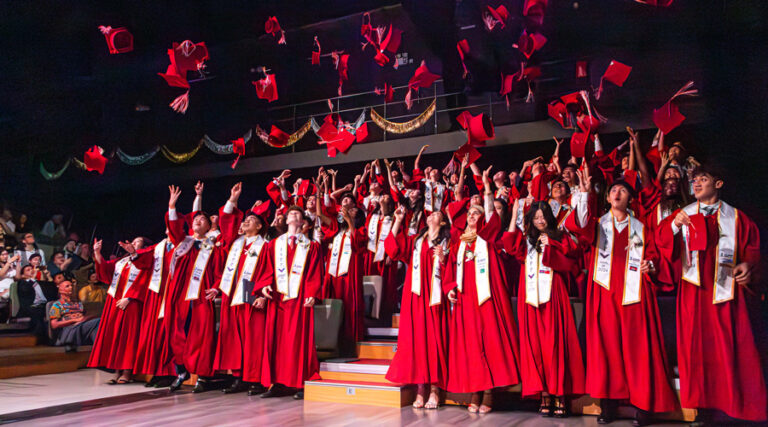Alumni Interview: Clara Kim
Class of 2014 | Years at ISPP 2012 – 2014
This is Clara Kim from the Class of 2014! After graduating from ISPP, I went to the US to attend a small liberal arts university called Sewanee. I majored in mathematics and economics (with a minor in business). I worked for a few years as a financial crime analyst at an investment bank before moving to London to earn my master’s in statistics two years ago. I’m currently working as a quants analyst at a consulting firm.
Outside of work, I love to dance. I was part of a Cambodian traditional dance troupe in the US and I’ve been taking salsa and bachata classes for the past two years in London.
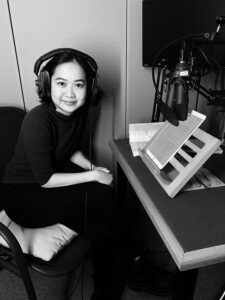
I also love to cook and share my love for Cambodian food with people. I’ve been working at different food festivals and pop-ups in London and I hosted my very first supper club to raise funds for a nonprofit in London last week.
My mother also recently released a memoir (which includes 20+ recipes) this year called Slow Noodles, which recounts her life as a Cambodian refugee who loses everything and everyone – home, family and country. So, I’ve been heavily involved with that project as well.
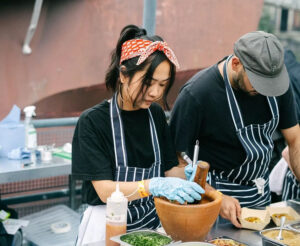
What years and grades did you attend ISPP?
I attended ISPP between 2012 and 2014 (Grades 11 and 12).
Where do you reside now?
I’m currently living in London! I’ve been here for two years and have loved every second of it.
Name the places you have lived in. Which was your favourite country to live in and why?
Cambodia, USA, Hungary and England. Phnom Penh will always be home but London is probably my favourite city to live in. It is a melting pot of different cultures, ethnicities and identities. I think it is a place where anyone can belong, no matter where you’re from or what you love to do. But if you absolutely hate rainy and gloomy weather, this might not be the place for you.
What did you miss most about living in Cambodia when you moved?
My family. And the food! I learned to cook when I left home because Cambodian food is not very accessible outside of Cambodia (except for maybe in some parts of the US like California and Massachusetts). But I also miss the culture and being able to speak Khmer freely.
What is your favourite ISPP memory?
They say that those who suffer together, bond together. I actually miss the late evenings and Saturdays when we’d come into the art studio to complete a project (go Mr Dara!). Those were the times I bonded the most with some of my classmates.
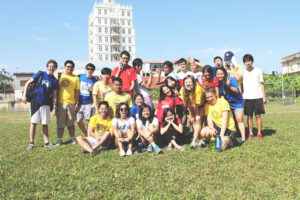
What are five things you wish you knew in secondary about life after graduation?
Not knowing what you want to do with your life at eighteen is okay. So, don’t panic. Your career aspirations and what makes you happy will change over time. It’s just a part of getting older.
What university-provided services did you use when in university and how were they helpful?
Take advantage of the career centre as early as possible. Job searching as an international student (if you intend to stay and work abroad) is a painful process. The centre can help you work on finding internships, write cover letters and CVs, prepare for job interviews and connect you with the alumni network.
The second one will be based on personal preference but volunteering is something I am very interested in. I’ve made so many great friends and learned a lot just by being involved with the university’s volunteer centre. I also think volunteering allows you to engage with a community at a much deeper level.
The volunteer centre also has great internships that are often overlooked. I actually got my first internship in London through a volunteer trip at LSE [The London School of Economics and Political Science]!
What skills do you need to be successful in your job?
Besides having the technical skills (if that is what your job will require), I think there are three really important soft skills you need – time/project management, communication (both verbal and written) and the ability to market yourself (you can be the best and fastest at what you do but make sure people know about it). I had to learn this the hard way.
What’s more challenging: analyzing financial crime or mastering the perfect salsa spin?
I’m not sure. One is a mental challenge while the other is a physical one. But I have to say, I have yet to master the perfect salsa spin.
What’s your “secret weapon” dish that always impresses your friends?
If I wanted to introduce someone to traditional Cambodian food for the first time, I make num banhjuk somlor namya, a simple coconut fish curry with rice noodles, the way my grandmothers made it. You can find the recipe on Slow Noodles 😉 I think Monument Books carries a few copies.
If you could invite any fictional character to your supper club, who would it be and what would you serve them?
I’m not sure about fictional characters but Anthony Bourdain has been my inspiration (besides my mother obviously) and even more so since I started working in the kitchen in London. I recommend reading his work, “Kitchen Confidential”. It will change the way you think about food and the restaurant business.
I would probably make him Namya, fried shrimp rolls and grilled pork ribs with green papaya pickles.
Tell us more about Slow Noodles and how you helped with the book.
Written with a co-author, Kim Green, Slow Noodles is my mother’s memoir about her life as a Cambodian refugee who had lost everything and everyone in her life. The book follows her journey as she reclaims the recipes from her mother’s kitchen in Battambang, her provincial hometown before the dictator Pol Pot tore her country apart and exterminated more than a million Cambodians. Recreating the dishes from her childhood becomes an act of resistance, of reclaiming her place in the world, of upholding the values the Khmer Rouge sought to destroy, and of honouring the memory of her beloved mother, whose “slow noodles” approach to healing and to cooking prioritised time and care over expediency.

The memoir also includes more than twenty family recipes for dishes like chicken lime soup, green papaya pickles, and pâté de foie, as well as Khmer curries, stir-fries, and handmade bánh canh noodles.
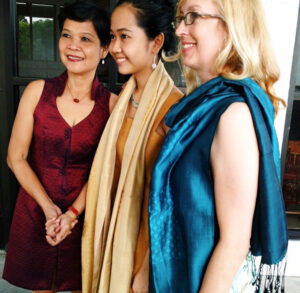
I wrote the epilogue and also narrated the audiobook. I also helped the co-author read many of the drafts and turned the recipes from my mother’s kitchen into words.
If you could write a new recipe into your mother’s memoir, what would it be?
This is a tough one. Our initial list of recipes includes dozens but we had to cut it down to about 20 for the book. I started collecting recipes from my mom when I was a freshman in college. I have about 100+ now and am considering publishing them sometime in the near future. khor ko, a slow-cooked beef stew served with egg noodles or sliced baguettes will be included.
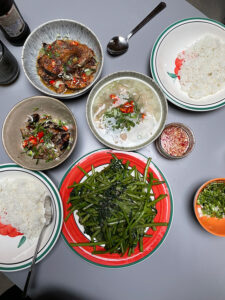
If you could only eat one Cambodian dish for the rest of your life, what would it be?
Somlor mju kreung sach ko for the win! Whenever I visit home, I always ask my mom to make this for me.
This interview was first published in the ISPP Pulse Magazine (August – October 2024).
More “Where Are They Now?” interviews:
- Victor Byenkya (2001 – 2005)
- Joseph Surivong (2002 – 2014)
- Visakha Som (1991 – 1996)
- Yoobin Kim (2012 – 2015)
- Gaurav Raul (2005 – 2007)
- Meghan McMurray (2015 – 2017)
- Enya Pangilinan (2009 – 2012)
- Vimuolea Hang (2006 – 2013)
- Frank van Zoggel (1991 – 1993)
- Sharlynn Ng (2005 – 2010)
- Brian Webster (2002 – 2016)
- Thida Leiper (1991 – 2005)
- Armando Abrahamsson (2010 – 2012)
- Luca Fleschler, Fraya Fleschler, Ximena Herrera (2011 – 2017)
- Dany, Soriya and Kalyane Warren (1996 – 2001)
- Nadia Fernando (1999 – 2015)
- Lotta Urban (1998 – 1999)
- Sreyneath Poole (2000 – 2005)
